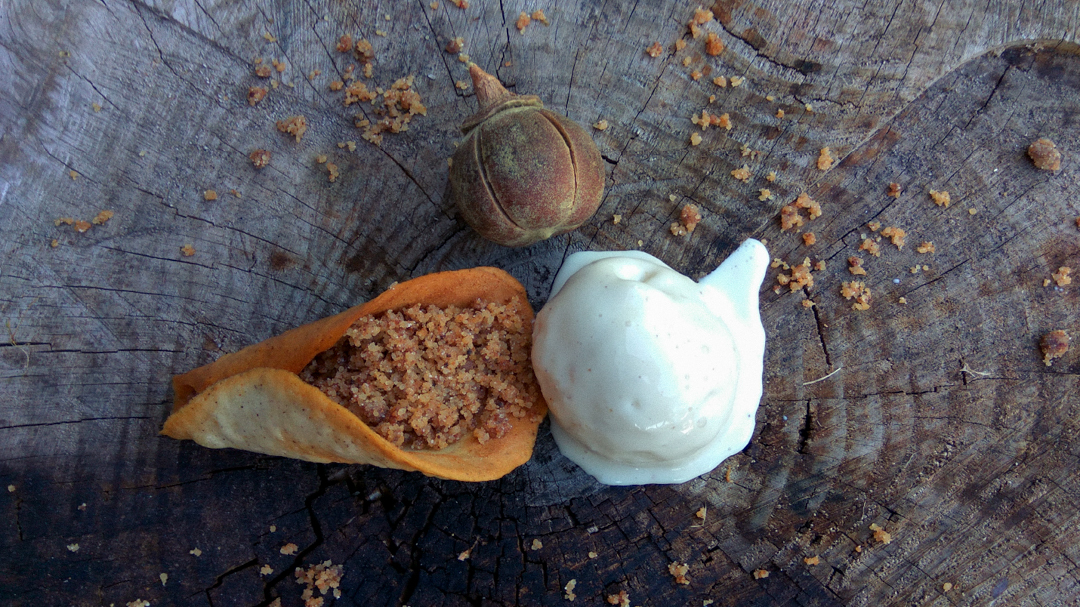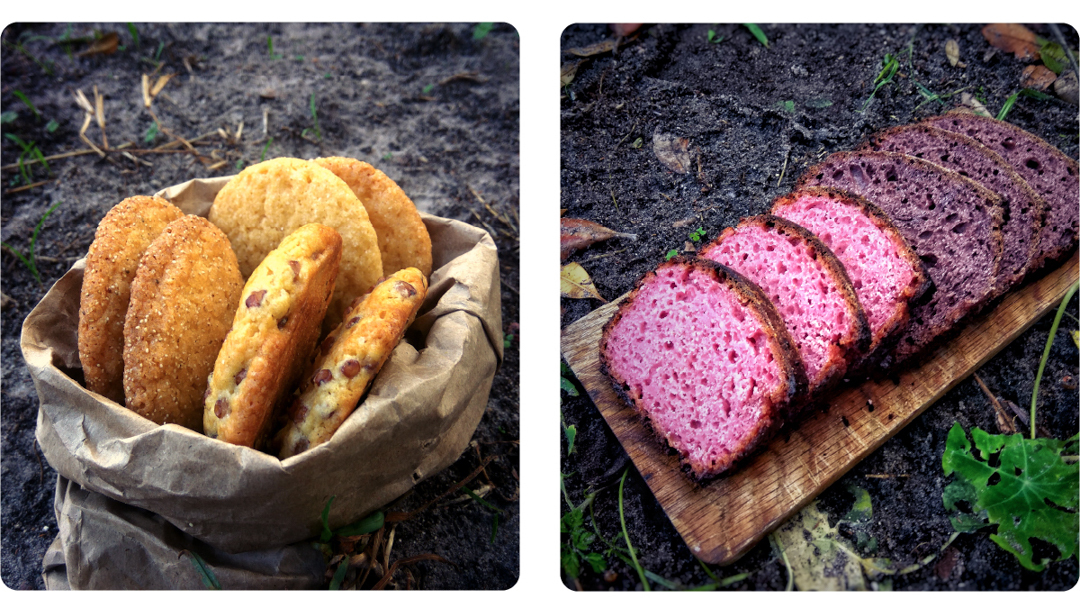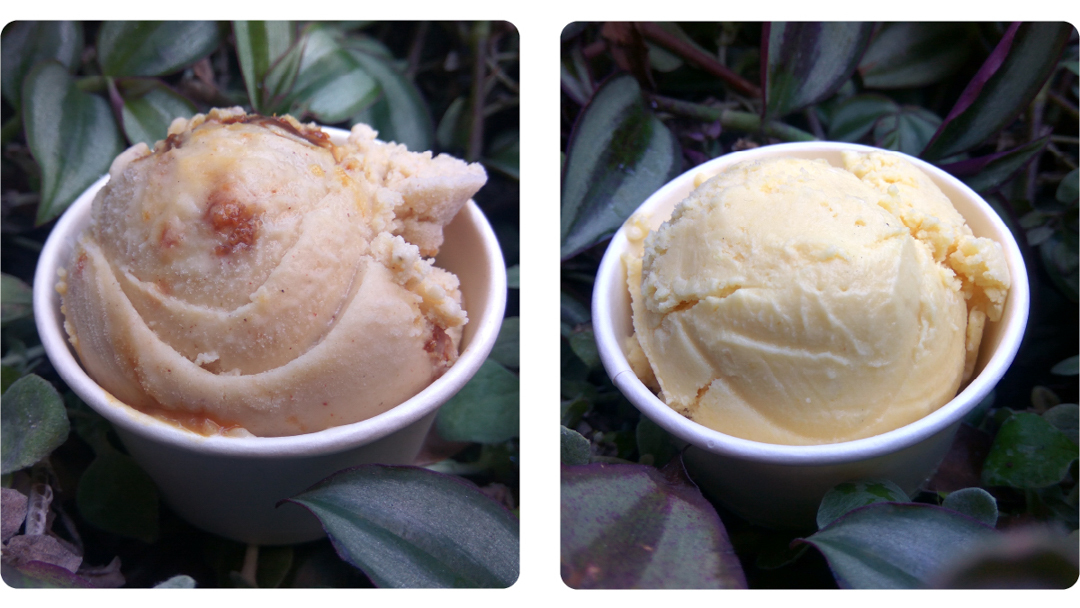Tapi Tapi: serving inspiration with every scoop

Megan
7 Sep, 2021
Pop into Tapi Tapi and you’ll notice that vanilla ice cream is not on the menu. Instead, you’ll find ice cream flavours inspired by the African continent that’ll delight your taste buds and feed your soul.
What started as a search for a gimmick to sell more ice cream, soon turned into an educational tool Tapiwa Guzha could use to empower people on the African continent. The Zimbabwean-born entrepreneur is on a mission to represent and celebrate African flavours and food.
“When I talk about ‘African’ flavours, I don’t mean it in the sense that Africa is one monolithic culture,” Tapiwa explains. “But that I draw inspiration from all corners of the continent. I’m curious about our differences and our similarities and how they overlap, so I do some research to determine how I can use various ingredients to make different flavours. I always do my best to represent different cultures in an honourable way.”
Read more: How to build rapport through active listening
We caught up with Tapiwa to get the scoop on how he turned his talent for making ice cream into a unique business that’s steering important conversations around identity and culture.
Where does your passion for ice cream stem from?
I actually don’t have a passion for ice cream. People often see the front end of Tapi Tapi and think that’s where the passion is. But it’s the backend, which is recognising that ice cream is a tool that I can use to share my passion. At the core of it, what I’m actually passionate about is recognising that as black people on the continent, our self-esteem, and our identities have been corroded and corrupted over time through colonial action, and a bunch of other factors as well. So my passion is restoring that self-esteem and ego to a healthier state. Whether that’s through food or through some of the other things that I do.
Is there a reason why you started with ice cream?
Initially, I started using ice cream because I was trying to break into the food market somehow, and ice cream was something that I had been making for myself for about eight years. When I started the company people didn’t understand what the big deal was about buying handmade ice cream. I explained to someone that if all you’re ever used to eating is fast food pizza, the first time you try homemade pizza, there’s a big difference. People are not aware of that difference.
I was trying to find a gimmick to get people to buy into my homemade ice cream so people could see the value it had. Initially, I made an alcoholic type of ice cream and it wasn’t really doing it for me. But then one day I was at a Zimbabwean restaurant in Salt River and I saw some snacks from home. I wondered what would happen if I put that flavour into ice cream. So I went home, bought a few other foods from Zimbabwe, and made five flavours. That’s when I realised that this is quite delicious, and it’s something that’s connecting with me on a more emotional level. It’s something that’s touching into my nostalgia, and it’s touching into the emotional connections I have with my people.
I then became hyper-aware of the fact that most of the food that I consume doesn’t reflect the fact that I live in South Africa, or that I grew up in Zimbabwe. And that’s true for most people that live on this continent. So then I realised that I could start teaching people and reminding them of the things that we have here using ice cream. Because for the first time I also recognised that I had never made an ice cream inspired by the continent. And if I had this blind spot, then surely other people do too and maybe I can correct some of that.

What was the response like when you first started selling flavours inspired by the African continent?
The response was positive with a healthy dose of scepticism as well. People were excited, but also cautious around engaging. There’s this thing about creating art: people can look at it from a distance and say ‘Oh that’s nice’, but then don’t commit to buying it.
There was quite a slow uptake at the beginning, which is normal for anything new. Even if I was making vanilla ice cream, it would have been slow, because it’s a new person making vanilla ice cream. But over time people got more comfortable with the quality of the products and wanted to try more flavours. Once I got some momentum going, it just kept going, and it hasn’t stopped.
What do you say to new customers to persuade them to try new flavours?
What I do is, I try not to sell ice cream. Normally the first thing people see on the chalkboard outside the store is ‘African ice cream’ and they ask what’s that. I explain to them it’s just flavours inspired by the continent. People are either sceptical or excited about that. For the excited people it’s easy enough, they come in, they try some and they find what they like or they don’t and we’ll move forward.
For the sceptical, it becomes about having a conversation – whether or not they want to try the ice cream. We’ll talk about why they’re sceptical about something they have no context around. I’ll say, ‘you’ve never eaten this, so why do you think it’s not good?’ and then encourage conversation around the internal dialogue they have with themselves around their identity, how they see African things, how they value things that are owned or created by a black person and having a conversation around that.
Some people are dismissive; they just walk away. And in other cases, it’s a matter of challenging them, saying ‘I dare you to eat this, what do you say?’ and then they come in and they leave with a changed perspective.
Read more: How to build rapport with your customers to increase sales
When you first launched Tapi Tapi, you started by dropping off products and doing pop-up events. What made you take this route?
Initially, the delivery thing was because I had a full-time job in Stellenbosch as a researcher and I couldn’t do it full-time at that point. Part of it was to save money so I could open up my own space, and part of it was to test the waters to see how people would engage with the work and the greater message around it.
It was about slowly taking manageable steps to get to a point where I could realise a dream. You have to realise that unless you have some major financial injection and a team of people with business know-how, it’s going to take some time to build a thing from the ground.
The tasting events were driven around two different ideas. The one idea was that people weren’t interested in buying a R150 tub of ice cream that they had never tasted before, and from someone whose food they had never tasted before. So the tasting events allowed for people to come and try out my food in general, and their feedback vouched for the quality of my ice cream. But then also central to that was the conversation. With the deliveries, there was no conversation. I dropped off a product and then moved on to the next house to drop off the next product. I always wanted to have a conversation, and not just pump out some scoops before moving on to the next customer.

What was it like to open your physical store?
It was exciting, but it wasn’t the most exciting part about Tapi Tapi’s journey. The most exciting moment was in 2018 when I decided to start. That was when I opened a social media page and told people, ‘Hey, I’m selling ice cream now’. That was a big celebratory moment for me because it went from being a thought in my head to a practical thing I was sharing with people.
But opening up my store last year was exciting. It was good to finally have a space where people could come through and try the product, have a conversation, bring their friends, come and hang out. Often what happens is when people are passing by, they’ll stop by just for conversation. So I’ve been able to build a sense of community around the work that I’m doing, and not just provide a product.
What would you say has been the biggest lesson you’ve learnt over the years?
There is never going to be a perfect time, or in my experience, there’s never going to be a perfect moment to execute any of the things I did. I just figured it out as I went along. For me, it was far more important to just get started than to wait for the perfect moment for everything to line up to get started.
How has Tapi Tapi has evolved over the years?
For me, the biggest evolution is and will be, about trying to move away from the ice cream. The ice cream space is just an incubator space; it’s just a sliver of showing people what you can do when you put your culture into an idea. So it’s a very entry-level step to what I am trying to do.
The natural progression is moving away from that and letting it run itself, so I can do more long-lasting, impactful work. For me, that would be moving into the art space and moving into manufacturing. Taking something as simple as clay pottery and other food technology from the continent and bringing it back into people’s houses. Most of the time people engage with clay pottery or ceramics as art, something you see in a museum or an archaeological site. But if you look at other global food technology like bamboo steamers or pizza ovens and sushi mats – these are all primitive technologies that are still in use and that even we, as Africans, value. But we don’t look at our own systems and see a similar value.
So it’s about finding ways of normalising authentic experiences, tools and technologies, and other creative things from the continent and infusing that into our daily life. Right now I’m trying to figure out how to make those transitions. Currently, I’m telling African stories through art, so African creation stories and stories around African mythology, because those are the stories that I would have loved to hear when I was growing up. So the ice cream does the job of bringing people to the cafe, and they engage with my art, and sure, they get ice cream, but they also leave with a story.
Get a taste of how Tapiwa runs Tapi Tapi by visiting the store in Observatory. You’ll leave with more than a scoop of ice cream.
If you’d like to share your business’ SnapScan story with us, please get in touch at stories@snapscan.co.za.
Related articles

10 side hustle ideas you can turn into a small business
Use your skills to help you earn some extra income

8 communication tips for success in sales
Effective communication is a key component in securing sales and building rapport.

Feat.: weaving curiosity into every aspect of their business
Adventurous designs are the hallmark of this gifting business.
